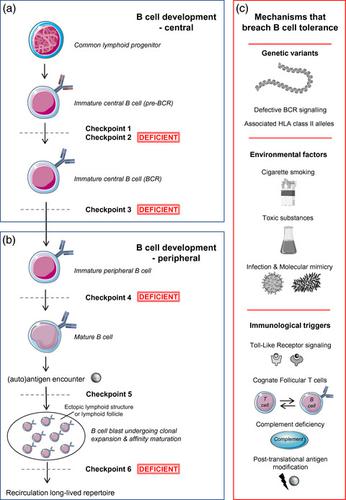当前位置:
X-MOL 学术
›
Clin. Exp. Immunol.
›
论文详情
Our official English website, www.x-mol.net, welcomes your
feedback! (Note: you will need to create a separate account there.)
Revisiting B cell tolerance and autoantibodies in seropositive and seronegative autoimmune rheumatic disease (AIRD)
Clinical & Experimental Immunology ( IF 3.4 ) Pub Date : 2020-10-22 , DOI: 10.1111/cei.13542 J N Pouw 1, 2 , E F A Leijten 1, 2 , J M van Laar 1 , M Boes 2, 3
Clinical & Experimental Immunology ( IF 3.4 ) Pub Date : 2020-10-22 , DOI: 10.1111/cei.13542 J N Pouw 1, 2 , E F A Leijten 1, 2 , J M van Laar 1 , M Boes 2, 3
Affiliation

|
Autoimmune rheumatic diseases (AIRD) are categorized seropositive or seronegative, dependent upon the presence or absence of specific autoreactive antibodies, including rheumatoid factor and anti‐citrullinated protein antibodies. Autoantibody‐based diagnostics have proved helpful in patient care, not only for diagnosis but also for monitoring of disease activity and prediction of therapy responsiveness. Recent work demonstrates that AIRD patients develop autoantibodies beyond those contained in the original categorization. In this study we discuss key mechanisms that underlie autoantibody development in AIRD: defects in early B cell development, genetic variants involved in regulating B cell and T cell tolerance, environmental triggers and antigen modification. We describe how autoantibodies can directly contribute to AIRD pathogenesis through innate and adaptive immune mechanisms, eventually culminating in systemic inflammation and localized tissue damage. We conclude by discussing recent insights that suggest distinct AIRD have incorrectly been denominated seronegative.
中文翻译:

重新审视血清阳性和血清阴性自身免疫性风湿病 (AIRD) 中的 B 细胞耐受性和自身抗体
自身免疫性风湿病 (AIRD) 分为血清阳性或血清阴性,取决于是否存在特异性自身反应性抗体,包括类风湿因子和抗瓜氨酸蛋白抗体。事实证明,基于自身抗体的诊断有助于患者护理,不仅用于诊断,还用于监测疾病活动和预测治疗反应。最近的研究表明,AIRD 患者会产生超出原始分类的自身抗体。在这项研究中,我们讨论了导致 AIRD 自身抗体发展的关键机制:早期 B 细胞发育的缺陷、参与调节 B 细胞和 T 细胞耐受性的遗传变异、环境触发因素和抗原修饰。我们描述了自身抗体如何通过先天性和适应性免疫机制直接促成 AIRD 发病机制,最终导致全身炎症和局部组织损伤。最后,我们讨论了最近的见解,这些见解表明不同的 AIRD 被错误地命名为血清阴性。
更新日期:2020-10-22
中文翻译:

重新审视血清阳性和血清阴性自身免疫性风湿病 (AIRD) 中的 B 细胞耐受性和自身抗体
自身免疫性风湿病 (AIRD) 分为血清阳性或血清阴性,取决于是否存在特异性自身反应性抗体,包括类风湿因子和抗瓜氨酸蛋白抗体。事实证明,基于自身抗体的诊断有助于患者护理,不仅用于诊断,还用于监测疾病活动和预测治疗反应。最近的研究表明,AIRD 患者会产生超出原始分类的自身抗体。在这项研究中,我们讨论了导致 AIRD 自身抗体发展的关键机制:早期 B 细胞发育的缺陷、参与调节 B 细胞和 T 细胞耐受性的遗传变异、环境触发因素和抗原修饰。我们描述了自身抗体如何通过先天性和适应性免疫机制直接促成 AIRD 发病机制,最终导致全身炎症和局部组织损伤。最后,我们讨论了最近的见解,这些见解表明不同的 AIRD 被错误地命名为血清阴性。











































 京公网安备 11010802027423号
京公网安备 11010802027423号